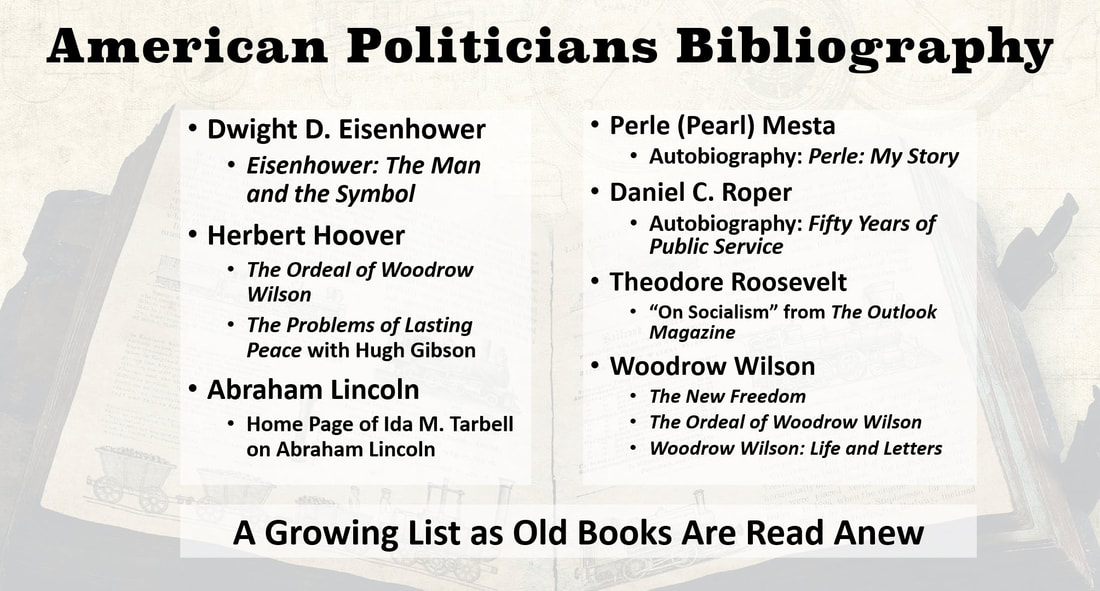Politicians Bibliography
|
Politician
|
Home Page
|
|
Dwight D. Eisenhower
|
“Gunther’s Eisenhower: The Man and the Symbol is a highly readable first-rate reporter’s appraisal of Eisenhower’s character—assets and liabilities. … [The reader] may not agree with the sum the author has totaled up but any reader must agree that Gunther has done a remarkably fair and intelligent job.
As much as I enjoyed reading about Woodrow Wilson, these books, particularly The Ordeal of Woodrow Wilson, added a depth of character and an understanding of the humanity of Herbert Hoover, much of which it seems has been lost in history. When Hoover wrote of what he accomplished to keep a devastated continent fed and clothed after years of war, a great respect grew for the man and I wanted to read more. His books have not disappointed.
|
Abraham Lincoln
|
Little did I know that when I started on a journey to understand Ida M. Tarbell, I would come to understand the greatness of one of our American Presidents: Abraham Lincoln. Ms. Tarbell was the most prolific researcher and author on President Lincoln. These are all of the works that I have found that she produced on one man's life.
|
Perle (Pearl) Mesta
|
“I had been in Luxembourg nine months when I returned to Washington for a consultation with the State Department, a customary procedure with ambassadors and ministers. … After my Washington consultations, I went up to New York for a few days and was given a luncheon there that I consider one of the greatest honors of my life [emphasis added].”
Perle Mesta, Perle, 1960
|
Daniel C. Roper
|
Daniel C. Roper, former United States Secretary of Commerce, died on Sunday, April 11, 1943 less than two years after publishing this autobiography on his life and documenting his fifty years of public service. He states in the work that he had “from Reconstruction days to World War II … lived under fifteen Presidents and served under six of them." A long career of public service that is captured in this book. I read this book to get some background on the Business Advisory Council (BAC) of which, Tom Watson was a member.
|
Theodore (Teddy) Roosevelt
|
This document is the edited combination of two editorials written by Theodore Roosevelt in 1909 for The Outlook: “Where We Cannot Work with Socialists” and “Where We Can Work with Socialists.” It seems timely, even though this perspective is over one century old, to challenge our ideas about socialism in today’s society but to also bring to the forefront the concept of "absolute" individualism.
When I saw several articles attacking Woodrow Wilson, I wondered how accurate and historically based the attacks were. I found: not so much. President Wilson was an amazing speaker, writer, philosopher and idealist. In fact the major flaw that almost all works on him seem to agree upon is that, in the end, his idealism was his Achilles heal.
Idealism seems like a wonderful trait for the man or woman inhabiting the corner office of the United States of America. I would take it over ruthless and cunning.
Idealism seems like a wonderful trait for the man or woman inhabiting the corner office of the United States of America. I would take it over ruthless and cunning.
